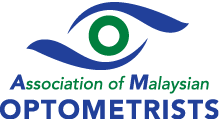The optometry profession and practice must be recognised as a professional health and clinical service to ensure best practices

The Association of Malaysian Optometrists (AMO) is a professional body that represents optometrists in Malaysia in bringing eye and vision care excellence to Malaysians.

It also advocates and protects the optometrist profession’s rights in Malaysia, connects optometrists under one trustworthy platform, and promotes and educates the public on quality eye care.
AMO President Ahmad Fadhullah Fuzai said: “We strive to reach the objectives of moderating or facilitating the regulation of the optometry profession through an evidence-based approach and provide advancement for optometrists through continuous professional education.
“We also actively promote and create public awareness about eye and vision and establish affiliation and collaboration with the local and international organisation.”
High demand for optometrists
Optometrists are primary eye care professionals who provide comprehensive eye examination and vision care services which include;
- Prescription of glasses and contact lenses,
- Rehabilitation of the visual system in lazy eyes and cases of binocular vision difficulties,
- Detection of common eye diseases,
- Plan a proper course of vision correction and therapy or carry out the appropriate referrals, and
- Co-management of patients with other healthcare professionals.
According to Ahmad, there is good demand for qualified optometrists in Malaysia. The Malaysian Government currently requires more eye care providers to be trained as optometrists. Therefore, job opportunities are high for optometry graduates.
However, he stressed that the optometrist profession needs to be recognised as an official health professional regardless of the sector
“Regarding the private sector, there are misconceptions about the role of optometrists that they are limited to only prescribing glasses and lenses. Optometry practices are often referred to as optical or spectacle retail shops.
“We require a policy or a regulatory standard to ensure optometry practices can only be opened and managed by qualified professional optometrists and to distinguish ourselves as a clinical health facility instead of a regular glasses and lenses dispensing shop.”
He explained that currently, with the registration under the Ministry of Housing and Local Government of Malaysia, optometry practices are classified as spectacle shops. This hinders optometrists from providing optimum services to the public, especially during the pandemic when they were listed as non-essential services.
Response to the Covid-19 pandemic
The Covid-19 pandemic, he said, very much affected the optometry industry along with other sectors and businesses in Malaysia.
“Because of the precautionary steps taken by the Government, the Ministry of Health (MoH) decided only several essential industries remain open with strict jurisdiction by the local authorities and standard operating procedure (SOP) given by the MoH.
“While the optometry industry was declared essential for primary eye care, the private practice was classified as non-essential.”
In response, the AMO successfully engaged with the National Security Council (MKN) for private optometry practices to be listed as essential services. Therefore, during the pandemic, optometrist practices were allowed to open for emergency cases.
“As we know, most MoH facilities were fully treating all Covid-19 patients during the pandemic. Therefore, AMO also worked with MKN to determine how private optometry practices could assist MoH facilities in emergency cases related to primary eye care.
“As such, by adhering to the MKN’s SOPs and approval of the local authorities, some optometrist practices were able to service primary eye care cases that can be diagnosed at optometrist practices near to the patients within the lockdown area or district.”
Activities and plans
AMO, said Ahmad, actively organises seminars, workshops and conferences for members to develop further and strengthen the optometry profession and services.
“Apart from that, we are also involved with new developments and changes in the eye care industry.
“We have contributed towards the Health White Paper development. AMO has also attended the meeting on the draft guideline for Private Allied Healthcare & Service Standalone organised by the MoH.
“AMO is also a Balai Ikhtisas Malaysia (BIM) board member. We also have collaborated with a few industries, such as Avisena Hospital, Sunway Medical Centre, SAMENTA, Bank Islam and NOVARTIS.”
AMO celebrates World Sight Day (WSD) annually. For WSD 2022, AMO will participate in the Focus Point World Sight Day 2022 Roadshow launch event.
It will also celebrate WSD with the Ministry of Defence (MINDEF) in the “Love Your Eyes” awareness campaign for the Malaysian Armed Forces at Hospital Angkatan Tentera Tuanku Mizan on Oct 18, 2022.
Upcoming events in November include; the 3rd Global Orthokeratology & Myopia Control Conference (GOMCC) from Nov 13 to 14; and the 3rd Asia Optometric Congress (AOC) from Nov 15 to 16.
Ahmad also disclosed that many events and programmes were planned for the years ahead.
“AMO will continue to promote by all reasonable means, the encouragement and advancement of eye care technology in its application, continuously evolve and in tandem being relevant to current times to provide quality eye care and preservation of sight.”
Apart from professional development, Ahmad stated that AMO would also continuously organise seminars and webinars on eye health and eye care and eye screening programmes for the public. – The Health







